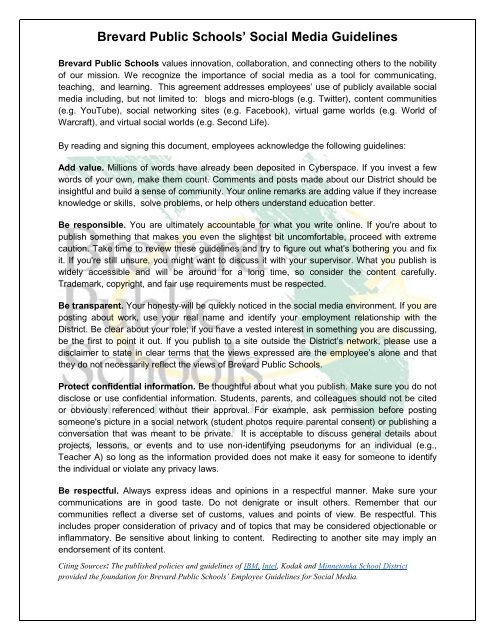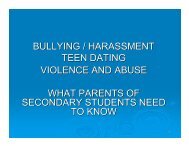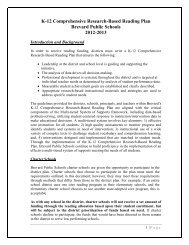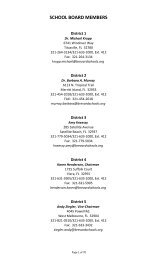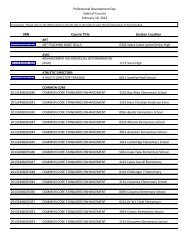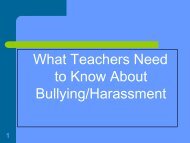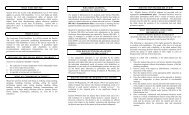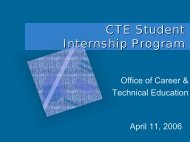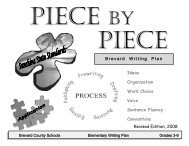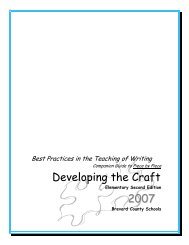Brevard Public Schools' Social Media Guidelines
Brevard Public Schools' Social Media Guidelines
Brevard Public Schools' Social Media Guidelines
Create successful ePaper yourself
Turn your PDF publications into a flip-book with our unique Google optimized e-Paper software.
<strong>Brevard</strong> <strong>Public</strong> Schools’ <strong>Social</strong> <strong>Media</strong> <strong>Guidelines</strong><br />
<strong>Brevard</strong> <strong>Public</strong> Schools values innovation, collaboration, and connecting others to the nobility<br />
of our mission. We recognize the importance of social media as a tool for communicating,<br />
teaching, and learning. This agreement addresses employees’ use of publicly available social<br />
media including, but not limited to: blogs and micro-blogs (e.g. Twitter), content communities<br />
(e.g. YouTube), social networking sites (e.g. Facebook), virtual game worlds (e.g. World of<br />
Warcraft), and virtual social worlds (e.g. Second Life).<br />
By reading and signing this document, employees acknowledge the following guidelines:<br />
Add value. Millions of words have already been deposited in Cyberspace. If you invest a few<br />
words of your own, make them count. Comments and posts made about our District should be<br />
insightful and build a sense of community. Your online remarks are adding value if they increase<br />
knowledge or skills, solve problems, or help others understand education better.<br />
Be responsible. You are ultimately accountable for what you write online. If you're about to<br />
publish something that makes you even the slightest bit uncomfortable, proceed with extreme<br />
caution. Take time to review these guidelines and try to figure out what's bothering you and fix<br />
it. If you're still unsure, you might want to discuss it with your supervisor. What you publish is<br />
widely accessible and will be around for a long time, so consider the content carefully.<br />
Trademark, copyright, and fair use requirements must be respected.<br />
Be transparent. Your honesty will be quickly noticed in the social media environment. If you are<br />
posting about work, use your real name and identify your employment relationship with the<br />
District. Be clear about your role; if you have a vested interest in something you are discussing,<br />
be the first to point it out. If you publish to a site outside the District’s network, please use a<br />
disclaimer to state in clear terms that the views expressed are the employee’s alone and that<br />
they do not necessarily reflect the views of <strong>Brevard</strong> <strong>Public</strong> Schools.<br />
Protect confidential information. Be thoughtful about what you publish. Make sure you do not<br />
disclose or use confidential information. Students, parents, and colleagues should not be cited<br />
or obviously referenced without their approval. For example, ask permission before posting<br />
someone's picture in a social network (student photos require parental consent) or publishing a<br />
conversation that was meant to be private. It is acceptable to discuss general details about<br />
projects, lessons, or events and to use non-identifying pseudonyms for an individual (e.g.,<br />
Teacher A) so long as the information provided does not make it easy for someone to identify<br />
the individual or violate any privacy laws.<br />
Be respectful. Always express ideas and opinions in a respectful manner. Make sure your<br />
communications are in good taste. Do not denigrate or insult others. Remember that our<br />
communities reflect a diverse set of customs, values and points of view. Be respectful. This<br />
includes proper consideration of privacy and of topics that may be considered objectionable or<br />
inflammatory. Be sensitive about linking to content. Redirecting to another site may imply an<br />
endorsement of its content.<br />
Citing Sources: The published policies and guidelines of IBM, Intel, Kodak and Minnetonka School District<br />
provided the foundation for <strong>Brevard</strong> <strong>Public</strong> Schools’ Employee <strong>Guidelines</strong> for <strong>Social</strong> <strong>Media</strong>.
<strong>Brevard</strong> <strong>Public</strong> Schools’ <strong>Social</strong> <strong>Media</strong> <strong>Guidelines</strong><br />
Perception can be reality. In online networks, the lines between public and private, personal<br />
and professional are blurred. Just by identifying yourself as a District employee, you are<br />
creating perceptions among community members, parents, students, and the general public<br />
about your expertise and about the District. You are also creating perceptions about yourself<br />
with your colleagues and managers. If you choose to join or engage with District students and<br />
families in a social media context, do so in a professional manner, ever mindful that in the minds<br />
of students, families, colleagues and the public, you are a District employee. Be sure that all<br />
content associated with you is consistent with your work and with the District’s operational<br />
beliefs and values. To the best of our abilities, District employees should always act to ensure<br />
and protect the safety of students--online and offline.<br />
Keep your cool. One of the aims of social media is to create dialogue, and people will not<br />
always agree on an issue. When confronted with a difference of opinion, stay cool. If you make<br />
an error, be up front about your mistake and correct it quickly. Express your points in a clear,<br />
logical way. Don’t pick fights. Sometimes, it’s best to ignore a comment and not give it<br />
credibility by acknowledging it with a response.<br />
Be careful with personal information. Make full use of privacy settings. Know how to disable<br />
anonymous postings and use moderating tools on your social media site(s). Astute criminals<br />
can piece together information you provide on different sites and then use it to impersonate you<br />
or someone you know, or even re-set your passwords.<br />
Be a positive role model. The line between professional and personal relationships is blurred<br />
within a social media context. Educational employees have a responsibility to maintain<br />
appropriate employee-student relationships, whether on or off duty. Both case law and public<br />
expectations hold educational employees to a higher standard of conduct than the general<br />
public.<br />
Don't forget your day job. You should make sure that your online activities do not interfere<br />
with your job. Remember that District technologies are provided for educational use. Use of<br />
social media for personal discourse during District time or on District equipment is prohibited.<br />
If you contribute to blogs, wikis, social networks, virtual worlds, or any other kind of social<br />
media—these recommendations are for you. We encourage all who participate in social media<br />
to understand and follow these guidelines.<br />
By my signature, I have read and understand the <strong>Social</strong> <strong>Media</strong> <strong>Guidelines</strong> as described above.<br />
___________________________________<br />
EMPLOYEE SIGNATURE<br />
_______________________<br />
DATE<br />
Citing Sources: The published policies and guidelines of IBM, Intel, Kodak and Minnetonka School District<br />
provided the foundation for <strong>Brevard</strong> <strong>Public</strong> Schools’ Employee <strong>Guidelines</strong> for <strong>Social</strong> <strong>Media</strong>.


